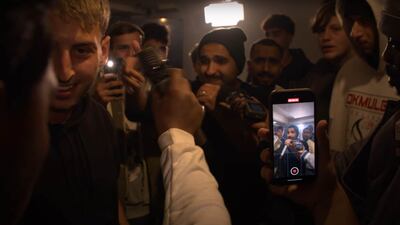It was supposed to be a routine university assignment. But when Jordanian film student Mohamed Al Takriti took his camera to a hip-hop event in Amman last summer, he stumbled upon an emerging scene.
Rappers from various suburbs, regions and age groups gathered in ciphers, dropping rhymes that spoke to youth and community concerns.
“I remember there was this real energy and community feeling because there were people from all over the country – from nearly every province – just to spend some time together showing their skills and listening to each other,” he tells The National. “Sometimes people say there is no hip-hop community in Jordan, but I saw it there that day and I realised that this was something that I had to document somehow.”
The aspiring filmmaker, 23, from the American University of Madaba, directed and edited Sout El Balad – a self-released, 30-minute documentary exploring Jordan’s nascent hip-hop community, now available on YouTube. With Al Takriti as a silent observer, the film weaves together energetic rap battles, intimate gigs and candid interviews with both emerging artists and seasoned voices – offering a glimpse into a subculture finding its voice.
Al Takriti recalls that pre-production for Sout El Balad took three months, followed by a week of shooting and another month of editing. “What really struck me was how diverse the scene was, and how clearly defined the generational lines were,” he says. “You had teenagers creating amazing work and escapist lyrics, and then you had older artists – by that I mean those in their thirties and forties – who spoke more about their personal lives and broader social issues affecting youth in Jordan.”
Both aspects are shown in interviews with Yousef, an emerging 17-year-old artist, and veteran performer Dodix.
“What people generally know about rap is that it is the voice of the streets, and some people take the wrong view of that and think the rapper is someone who causes trouble,” Yousef remarks at the onset of Sout El Balad. “Amman is my biggest inspiration. I live here and rap about what happens here … but at the same time, I do it through a kind of persona that’s not really me in real life.”
As for Dodix, a more experienced performer, he notes how he uses his alter ego as a comfort blanket to dig deep into his emotions. "I'm the kind of person who talks about things I've been through, things I feel, and sometimes I drift into my imagination. I build a story in my head and talk about it, even if it never actually happened," he says. "Everyone in this world has a good side and a bad side. In a track, I can talk about my bad side – the part of me I don't want anyone to know."
The documentary also highlights efforts to legitimise the scene, such as a hip-hop workshop held in Zarqa – Jordan’s second most populous city after Amman – organised in collaboration with the United Nations Relief and Works Agency for Palestine Refugees, as well as freestyle events hosted by the artist collective Bellagons across the city
“These events provide some of the key themes for the documentary in that the music gives them a sense of hope and new ways to dream,” Al Takriti says. “These freestyle sessions were amazing to see, especially the emotions behind them. People from older generations might be used to different kinds of music. They might not accept hip-hop. They don’t understand it yet. But younger people are growing up with it – they’ve been listening to it since they were kids. So they’re more open to it. It’s growing.”

That said, Jordanian hip-hop’s growth into a genre to be reckoned with will take some time. Sout El Balad highlights how – due to a lack of industry support – the genre lacks the infrastructure to resonate more widely. “There are not many opportunities for live shows at a high-profile level and the recording equipment is basic. There aren't a lot of recording studios available, and that will hopefully change as Jordan is such a culturally rich country,” Al Takriti says. “They do deserve more support and maybe that will come at a later stage. These artists have the talent, but sometimes, when no one really believes in you, you need to believe in yourself first and prove yourself – because every artist faces difficulties.”
Al Takriti hopes to continue exploring the genre beyond his degree, which he completes next year. He views Sout El Balad as a first draft, with future projects aiming to offer a deeper look into Jordan’s hip-hop community – including a focus on female participation. He acknowledges that the documentary’s main flaw is the lack of female representation, attributing it to their discomfort to appear on screen at this time.
He’s confident that will change as more independent Jordanian musicians and genres gain recognition – both at home and abroad. “I want to continue documenting music in Jordan – not just rap, but the broader music culture,” he says. “We need more music documentaries in the Arab world, because there are so many great stories out there to tell.”
Sout El Balad is available for streaming on YouTube








